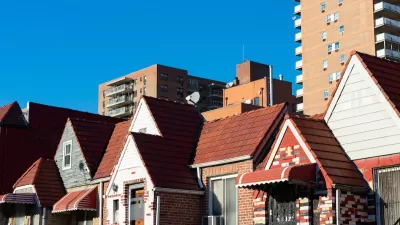Paul Krugman, one of the most influential voices of liberal policy in the United States, has identified a culprit in the U.S. affordability crisis: over-regulation.

Paul Krugman begins an op-ed that identifies land use regulations as the cause of the affordability crisis in urban America by establishing some historic context. "Specifically, urban America reached an inflection point around 15 years ago," writes Krugman, "after decades of decline, central cities began getting richer, more educated, and, yes, whiter. Today our urban cores are providing ever more amenities, but largely to a very affluent minority."
The big question of the op-ed, however, is why? And a second question: "is there any way to spread the benefits of our urban renaissance more widely?"
First, Krugman credits/blames the modern high-wage earner, willing to pay a premium to live closer to work and reduce commute times. " Hence gentrification," writes Krugman. "And this is a process that feeds on itself: as more high earners move into urban centers, these centers begin offering amenities: — restaurants, shopping, entertainment — that make them even more attractive."
Then, Krugman echoes the words of Jason Furman, the chairman of the White House Council of Economic Advisers, who recently began a public relations campaign, of sorts, about the effects of restrictive land use policies on housing supply and housing affordability.
"The good news is that this is an issue over which local governments have a lot of influence. New York City can’t do much if anything about soaring inequality of incomes, but it could do a lot to increase the supply of housing, and thereby ensure that the inward migration of the elite doesn’t drive out everyone else. And its current mayor understands that."
The conclusion of the article promises more on the subject of housing policy and what it will take to deliver on the supply that Krugman desires.
FULL STORY: Inequality and the City

Planetizen Federal Action Tracker
A weekly monitor of how Trump’s orders and actions are impacting planners and planning in America.

Chicago’s Ghost Rails
Just beneath the surface of the modern city lie the remnants of its expansive early 20th-century streetcar system.

San Antonio and Austin are Fusing Into one Massive Megaregion
The region spanning the two central Texas cities is growing fast, posing challenges for local infrastructure and water supplies.

Since Zion's Shuttles Went Electric “The Smog is Gone”
Visitors to Zion National Park can enjoy the canyon via the nation’s first fully electric park shuttle system.

Trump Distributing DOT Safety Funds at 1/10 Rate of Biden
Funds for Safe Streets and other transportation safety and equity programs are being held up by administrative reviews and conflicts with the Trump administration’s priorities.

German Cities Subsidize Taxis for Women Amid Wave of Violence
Free or low-cost taxi rides can help women navigate cities more safely, but critics say the programs don't address the root causes of violence against women.
Urban Design for Planners 1: Software Tools
This six-course series explores essential urban design concepts using open source software and equips planners with the tools they need to participate fully in the urban design process.
Planning for Universal Design
Learn the tools for implementing Universal Design in planning regulations.
planning NEXT
Appalachian Highlands Housing Partners
Mpact (founded as Rail~Volution)
City of Camden Redevelopment Agency
City of Astoria
City of Portland
City of Laramie





























